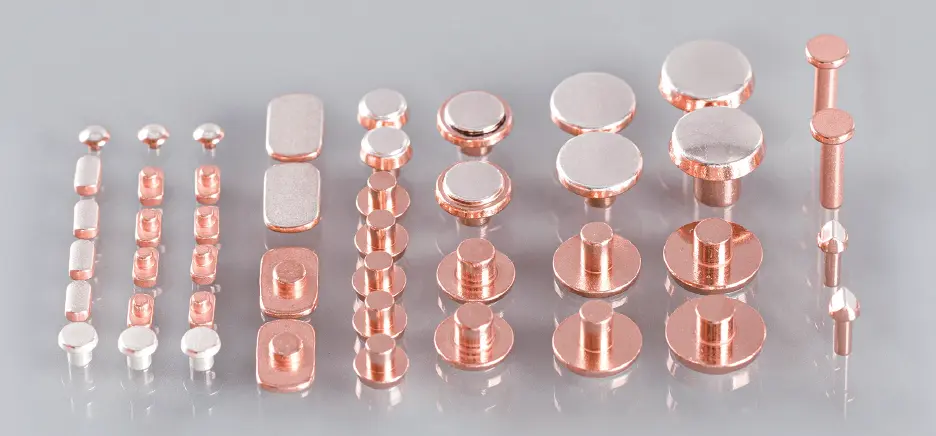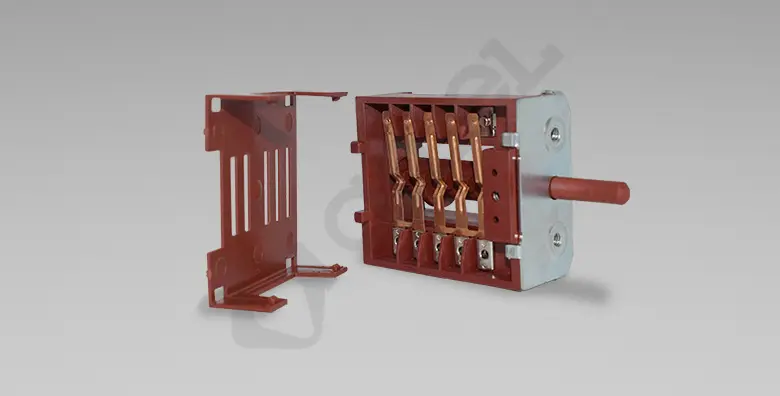The demand for high-performance, reliable, and durable electrical components has surged with the rapid growth of automation, consumer electronics, and industrial applications. Among these components, rotary switches, commonly used for their simplicity and tactile feedback, are crucial in various devices. A key element in ensuring the reliability and longevity of these switches is the choice of contact materials. AgNi (Silver-Nickel) alloys have emerged as a preferred material for rotary switch contacts due to their exceptional electrical conductivity, wear resistance, and corrosion resistance.
Why AgNi Alloys?
AgNi alloys, a combination of silver (Ag) and nickel (Ni), are particularly well-suited for applications that require frequent switching and reliable performance over time. Silver is known for its excellent electrical conductivity, making it an ideal choice for electrical contacts. However, pure silver tends to tarnish or oxidize when exposed to air, which can lead to degradation of electrical performance. Nickel is often added to silver to improve its hardness, wear resistance, and oxidation resistance, creating a balance between performance and durability.
Benefits of AgNi in Rotary Switches
- Enhanced Electrical Conductivity.
AgNi alloys retain the excellent electrical conductivity of silver, ensuring low contact resistance in rotary switches. This is crucial for minimizing power loss and ensuring smooth operation, particularly in applications that require high switching frequencies and low voltage drops.
- Durability and Wear Resistance.
One of the primary advantages of AgNi alloys is their ability to withstand mechanical wear. Rotary switches, which involve frequent and repetitive movement of contacts, can suffer from contact erosion over time. AgNi alloys, thanks to their nickel content, exhibit excellent resistance to wear and tear, extending the lifespan of the switch and ensuring consistent performance over many switching cycles.
- Corrosion Resistance.
Silver’s susceptibility to corrosion and tarnishing can reduce the effectiveness of electrical contacts. AgNi alloys are resistant to tarnish and corrosion, making them more reliable in harsh environments, such as high humidity or varying temperature conditions. This is particularly important in industrial settings or outdoor applications, where exposure to moisture and temperature fluctuations can otherwise compromise the performance of mechanical switches.
- Arc Resistance.
When a rotary switch is engaged or disengaged, electrical arcs can form between the contacts. AgNi alloys have been engineered to resist these arcs, minimizing the impact of switching transients and reducing the risk of contact degradation. The alloy’s superior arc resistance ensures stable operation even in high-power or high-voltage applications.
- Cost-Effectiveness.
While silver is a precious metal, the incorporation of nickel in AgNi alloys reduces the overall cost of the material compared to pure silver. This makes AgNi an economical choice for applications where performance is critical but cost control is also important. The added durability and longevity further improve the cost-effectiveness by reducing the need for replacements and maintenance.
Applications in Rotary Switches
Rotary switches are widely used in applications ranging from household appliances and consumer electronics to industrial control systems and automotive electronics. AgNi alloys have found particular application in high-precision rotary switches used in:
1. Automotive Electronics.
Rotary switches are often used in vehicles to control lighting, ignition, and power windows. The durability and arc resistance of AgNi alloys ensures that these switches operate reliably over time, even in the demanding automotive environment.
2. Industrial Control Systems.
RRotaryed in industrial settings in industrial settings to control, equipment, and processes. AgNi alloys provide the durabildurability necessaryhstand the heavy-duty use of these systems, ensuring long-term reliability and minimizing downtime.
3. Consumer Electronics.
Rotary switches in devices like audio equipment, power controls, and home appliances benefit from the superior conductivity and wear resistance of AgNi alloys, offering a smoother user experience and longevity.
4. Medical Equipment.
Rotary switches are used in some medical devices, where reliability and precision are paramount. AgNi alloys help ensure consistent performance in critical applications, where switch failure is not an option.
Future Prospects
As industries continue to innovate and embrace more advanced technologies, the demand for high-performance components will only increase. AgNi alloys are expected to play an increasingly significant role in the development of new-generation rotary switches, particularly in applications requiring higher power ratings, faster switching speeds, and enhanced reliability.
Moreover, ongoing research into optimizing the composition of AgNi alloys may lead to even more advanced versions of this material, offering further improvements in conductivity, durability, and environmental sustainability. Innovations in surface coatings and processing techniques may also enhance the performance of AgNi alloy contacts, making them even more suited for next-generation rotary switch applications.
Conclusion
AgNi alloys represent a perfect synergy between silver’s exceptional electrical properties and nickel’s durability and resistance to corrosion. In the context of rotary switches, this combination provides a reliable, long-lasting solution for applications across a wide range of industries. As the demand for more efficient, durable, and cost-effective electrical components continues to rise, AgNi alloys are set to remain a key material in ensuring the optimal performance of rotary switches for years to come.
Post time: Jan-17-2025


